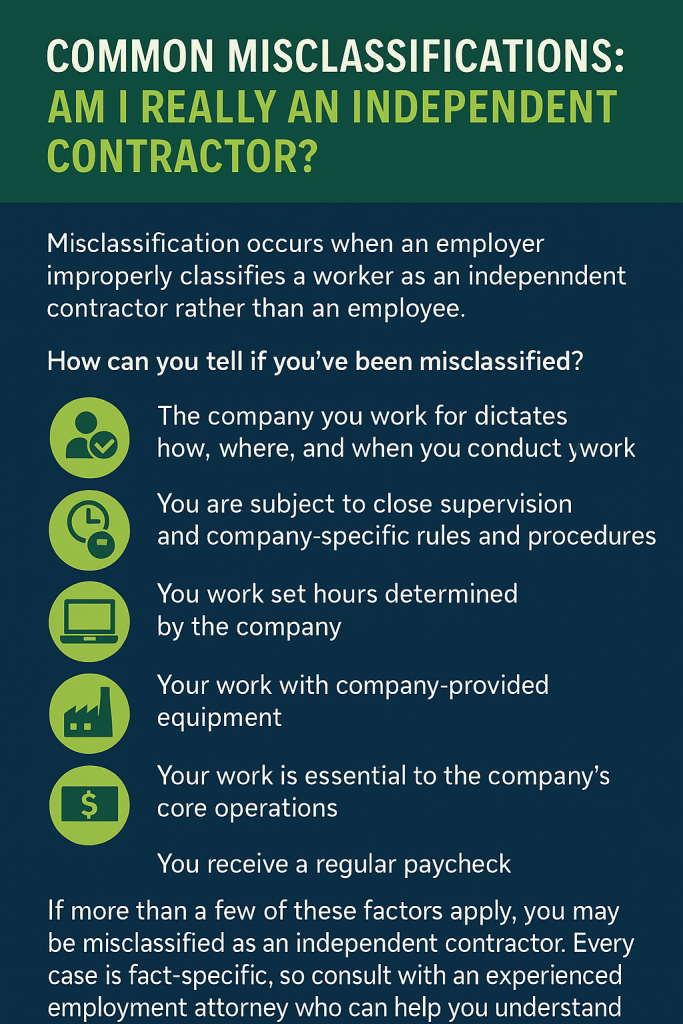An independent contractor is a self-employed person who does contract work for businesses or other individuals. The distinction between “independent contractor” and “employee” is significant because it determines rights, benefits, and responsibilities under state and federal labor laws. Misclassification of employees as independent contractors can lead to legal consequences for employers.
The employment attorneys at The Noble Law are well-versed in these matters and can provide you with the knowledgeable guidance you need regarding misclassification, unpaid overtime, and other issues that arise when the definition of independent contractor comes into question.
Common Misclassifications: Am I Really an Independent Contractor?
Misclassification occurs when an employer improperly classifies a worker as an independent contractor rather than an employee.
How can you tell if you’ve been misclassified? Here are a few warning signs that may indicate you are being compensated as an independent contractor but are taking on the responsibilities of a full-fledged employee:
- The company you work for dictates how, where, and when you conduct your work
- You are subject to close supervision and company-specific rules and procedures
- You work set hours determined by the company
- You work with company-provided equipment
- Your work is essential to the company’s core operations
- You receive a regular paycheck
If more than a few of these factors apply, you may be misclassified as an independent contractor. Every case is fact-specific, so consult with an experienced employment attorney who can help you understand how the law applies in your unique situation.
How Is This Arrangement Hurting You?
If you are misclassified as an independent contractor, there are a number of ways this may be damaging to your finances, your career advancement, and even your health.
No Overtime
Overtime laws apply only to employees. As an independent contractor, you will not receive time and a half for the hours you work in excess of 40 hours. If your workload is heavy, you could be missing out on a lot of pay—to the benefit of your employer.
Lack of Benefits
Most employees are eligible for health insurance benefits, retirement, and paid time off, while independent contractors are not. Employers pay a lot to provide these benefits to their employees, which is one reason misclassification occurs.
Unemployment Benefits
Employees enjoy the safety net of unemployment benefits in the event of a layoff, while independent contractors have no such protections.
Job Security
It is generally much easier for an employer to cut ties with an independent contractor than a full-time employee. Furthermore, independent contractors typically have limited access to training and advancement that full-time employees benefit from.
These are only a few of the ways misclassification can hurt you. Talk with a knowledgeable employment attorney to learn how you can use the law to pursue compensation for these losses.
How to Protect Your Rights as an Independent Contractor
If you have concerns that you have been misclassified, here are a few things you can do to protect your rights:
Document Everything
Keep detailed records of the hours you have worked, the nature of the work, the degree of control you have over your schedule and other evidence that indicates you might more accurately be classified as an employee.
Reach Out to a Government Agency
Your issue may fall under the authority of any of a number of state or federal agencies.
- You can reach the U.S. Department of Labor’s Wage and Hour Divisions tipline at 866-487-9243
- In North Carolina, you can reach out to the Employee Classification Division of the NC Industrial Commission via email at [email protected] or by telephone at 888-891-4895
- In South Carolina, these matters are handled by the South Carolina Department of Labor, Licensing, and Regulation, which you can find online here.
Get Legal Help
Of course, you don’t have to face this complex legal issue alone. An employment attorney who is well-versed in the laws regarding employee classification in North Carolina and South Carolina can help you understand your rights and explore all the legal options available to you.
What Does a Good Legal Outcome Look Like?
By pursuing legal action after being misclassified as an independent contractor, you can open the door to a number of favorable outcomes, including:
- Back pay for overtime
- Compensation for denied employee benefits, including health insurance, workers’ compensation and paid time off
- Accurate employment status moving forward
- Tax adjustments and reimbursements
The employment attorneys at The Noble Law will carefully review your situation to help you determine the best course of action. If your case has merit, we will work tirelessly to help you obtain the compensation you need to make up for lost income and benefits while paving the way forward to a more prosperous and financially stable future.
Get in Touch With an Attorney Who Can Help
We have been protecting the rights of workers in North and South Carolina since 2009, and have built a reputation for integrity, trustworthiness, and results. To speak with an experienced employment law attorney about your misclassification issue, contact us today.
About The Noble Law Firm
The Noble Law is a women-owned employment law firm with offices in North Carolina and South Carolina, founded by Laura Noble in 2009. Specializing in wrongful termination, workplace harassment, workplace retaliation, workplace mediation, and neutral third-party investigations, the firm is committed to leveling the playing field for employees. Their focus is on delivering positive outcomes with empathy and integrity, while also driving societal change in employment law.
The firm emphasizes diversity, collaboration, and innovation, fostering a balanced work environment that values the personal lives of its staff. With a strong commitment to technology and efficiency, The Noble Law provides personalized attention to a select group of clients, handling cases involving harassment, discrimination, retaliation, and more. The team’s extensive litigation experience allows them to deliver thorough and assertive representation.


